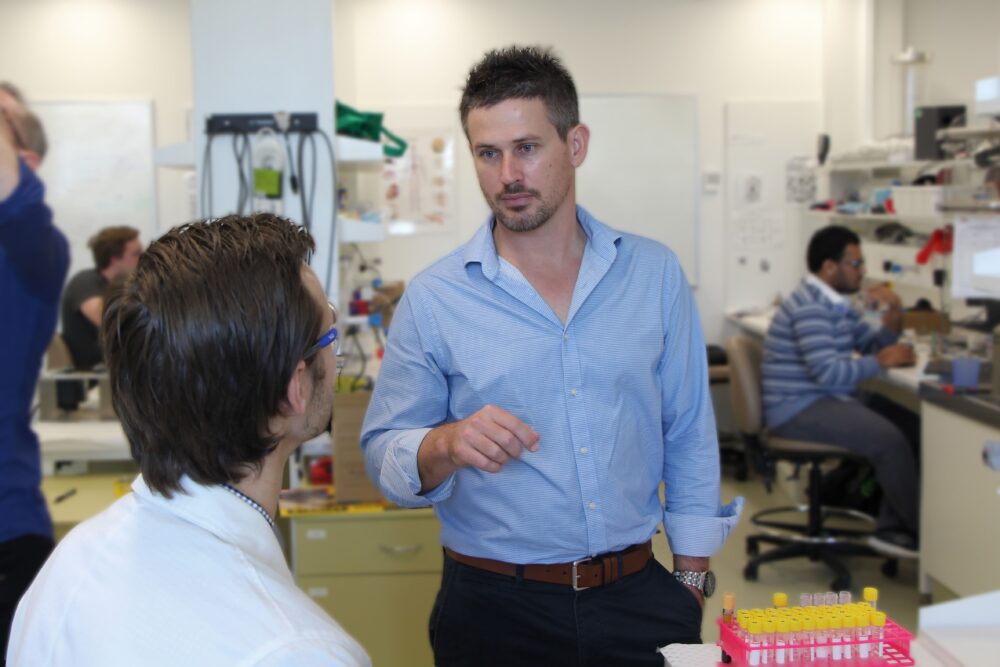A dedicated team at Griffith University is working towards developing a new era of artificial medical devices that are friendlier to blood—potentially improving the health outcomes for millions of patients worldwide.
2018 Young Tall Poppy winner, Dr Michael Simmonds has recently teamed up with Professor Geoff Tansley—a leader in blood pump design and engineering—to pave a way towards developing new generations of medical devices that will significantly reduce blood damage.

Tall Poppy Winner Michael Simmonds
Mechanical circulatory support (MCS) devices are now commonly used to facilitate complicated surgical procedures and also long-term therapeutic strategies that were previously unattainable.
These devices have been developed to support the body’s need for oxygenated blood and may be used short-term during cardiothoracic surgery (e.g. cardiopulmonary bypass) or during prolonged periods when the native heart is dysfunctional (e.g, ventricular assist devices)—possibly for as long as a decade.
Researchers from the Menzies Health Institute Queensland have identified, however, that the stresses typically generated within these devices irreversibly impair blood cell function—ultimately leading to disrupted blood flow in the body.
The consequences of poor blood health often include organ failure, stroke and premature death.
Recipients of certain types of MCS have a less than 10% chance of being free from major health problems within 12 months of use. Unfortunately, the cause of these health outcomes remain poorly understood.
The newly formed team of Dr Simmonds and Professor Tansley—the Griffith University MechanoBiology Laboratory (GUMBL)—are developing novel biophysical approaches with an aim to eliminate blood trauma from MCS devices.
Dr Michael Simmonds, who also heads Griffith’s Biorheology Research Laboratory, says his team have made significant breakthroughs in understanding how subtle changes to the physical and biochemical prosperities of blood cells can have devastating effects following surgery.
“We have identified that blood cell mechanics are irreversibly altered by the shear stresses and free radicals produced during MCS,“ he says.
“Our interdisciplinary approach has had early successes that will have applications in design and manufacturing, leading to improved clinical outcomes following MCS use.”
“I hope that my work with engineers and medical doctors will lead to improved medical device designs, and ultimately, better health outcomes in the months and years following surgery.”
“It is very important to note, however, that our ambitious goals will only be realised through focused and interdisciplinary research.”
“Being aware of the limitations of your chosen discipline and engaging collaborators with strengths that expand your horizon, is essential for meaningful progress.”
“Our newly developed team in GUMBL represents a tantalising opportunity to extend our recent biological studies to hopefully apply these findings in a manner not possible using an insular approach.”
“It is truly invigorating to experience what can be done when you share a workspace with experts who have diverse skills in medicine, engineering and science.”
Menzies Health Institute Queensland researcher, Professor Geoff Tansley works within Griffith University’s School of Engineering and Built Environment.

Professor Geoff Tansley
He says the possibility to positively impact millions of patients worldwide drives their research success at GUMBL.
“What excites me about this new lab and the opportunity to work with Michael’s team is the chance to guide the development of life-saving MCS devices,” he says.
“Our research has the potential to improve the quality of life for patients who have already suffered a great deal through heart failure—and don’t want to suffer from its cure.”
“We are extremely pleased by the response from researchers around the world.”
“In our first year of GUMBL we’ve had visitors from Japan, Malaysia and the USA.”



